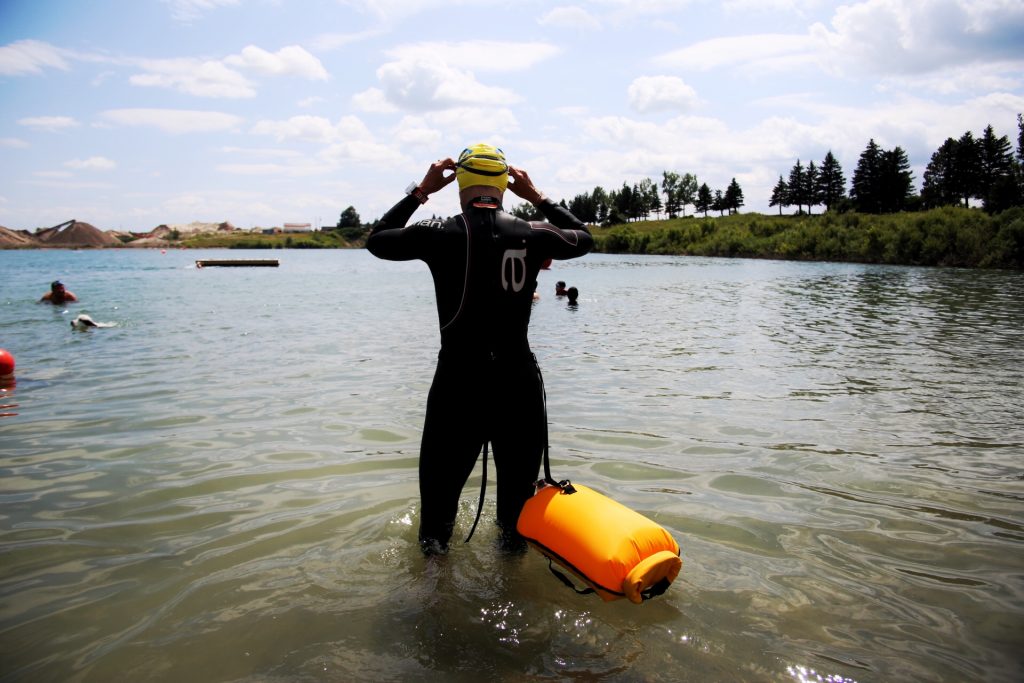by Sandie Orlando
Open water swimming is notorious for causing stress for triathletes. Even proficient pool swimmers can feel anxiety when faced with dark water, a wetsuit or lots of other bodies thrashing around them. Each athlete experiences this differently. Some are just excited-nervous and it goes away quickly. For others, it can be persistent, paralyzing, race destroying and sometimes turns them away from doing triathlon at all.
Dealing with open water swimming anxiety isn’t about getting over it once. For some triathletes, it’s persistent and requires strategies to just get through it – every time. Understanding how your body responds and figuring out how to deal with those reactions is more productive than trying to understand why it happens.
Sandie is an anxious open water swimmer who got through Ironman
For those who are in the latter category, the well-meaning advice from those who have no issue with it at all sometimes isn’t that helpful. It helps if you understand what the anxiety comes from in the first place, but recognizing how your body reacts and adopting tactics for dealing with those reactions can be more productive in the long run.

Here are some ideas that can help:
- Take the pressure off yourself in early open water swim sessions by leaving the ‘workout’ behind and just get accustomed to being in the water in a wetsuit. Your balance in the water will feel different with the buoyancy, which can throw off your rotation. The feeling of constriction on your chest and neck can cause a feeling of panic and shortness of breath. Work at going a little bit further or longer each time and giving yourself time to rest and gather yourself mid-swim. This is especially important when dealing with waves or chop in certain segments of the course.
- If you tend to get out of breath and start feeling panic 100m or so into your swim, try doing a warm up to get your heart rate up before getting into the water. By getting your heart rate and breathing rate up, it helps your body deal with that spike when you first start swimming, making it less shocking and uncomfortable. Run up and down a hill, do jumping jacks, run on the spot – whatever gets your heart rate up!
- Deal with colder temperature shock up front. Let some water into the front of your wetsuit when you first get in. Your body heat will warm up that layer of water and act as a bit of insulation – and lubrication. Get your face and head under water by doing a few dolphin dives. This also gives you a chance to check that your goggles aren’t leaking or fogging while you can stand up and adjust them.
- Do some short, fast efforts in the water as part of your warm up and let your HR settle after each before starting into the longer sets. Then practice your ‘alligator eyes’ sighting to remind yourself of the pattern in combination with taking a breath. This also helps get you more accustomed to keeping your face and mouth in the water.
- Remind yourself to keep your core tight and your body in a straight line. Practice breathing to the side while keeping one goggle in the water. This helps avoid the tendency to lift your head and over-rotate, which just adds to the feeling of struggling.
- Try breathing with every stroke instead of every three or five as you would in the pool until you settle into a rhythm and your breathing calms down.
- Ignore the plants and critters. There is nothing in the weeds or lake water that’s likely to be dangerous or particularly interested in you. Murky water just means there is silt or sand at the bottom which you are swimming over. You are meant to be horizontal and kicking at the top of the water anyway. Use your sighting to remember that other people are around you and to appreciate the landscape above the water line instead.
- In training, swim with other people for safety, but ignore how fast and great they look. Do your own thing and work at slaying your own dragons while focusing on staying calm.
- Use positive self-talk. Instead of saying “I suck at this and I hate it”, try saying “I’m getting better at this and I’m okay”. Give yourself points for showing up, even if it didn’t go so well. It makes a big difference!



